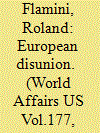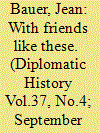| Srl | Item |
| 1 |
ID:
134092


|
|
|
|
|
| Publication |
2014.
|
| Summary/Abstract |
Screaming their defiant war cries, Scottish clansmen pointed their long spears and prepared to meet the English charge. The two armies came together in bloody combat, the helmeted English knights, slowed by their cumbersome armor, outmaneuvered by the more agile, more lightly armed Scots, and eventually overwhelmed. When the English drew back, leaving hundreds of dead and wounded on the field, the screaming clansmen charged, turning the enemy's disciplined retreat into a rout.
|
|
|
|
|
|
|
|
|
|
|
|
|
|
|
|
| 2 |
ID:
130595


|
|
|
|
|
| Publication |
2014.
|
| Summary/Abstract |
The literature on foreign, or "transnational," war volunteering has focused overwhelmingly on the motivations and experiences of the volunteers. This approach has largely overlooked other aspects of the phenomenon such as the military and political use that host states can derive from foreign fighters. This article focuses on the enlistment of international volunteers by the Israeli armed forces in the war of 1948-49. Drawing on a combination of archival material, interviews with veterans, and secondary literature, the article assesses the relative importance of "Machal" (Israel's overseas volunteers) by comparing the role played by these foreigners with that of transnational volunteers who fought in other twentieth-century conflicts
|
|
|
|
|
|
|
|
|
|
|
|
|
|
|
|
| 3 |
ID:
131447


|
|
|
|
|
| Publication |
2013.
|
| Summary/Abstract |
In the summer of 1780, John Adams and the Comte de Vergennes crossed epistolary swords over America's status in the Franco-American Alliance. Understanding their irreconcilable policies explains how a minor dispute about paper money erupted into a fight over the control of post-war American commerce, which became a battle over the proper deployment of the French Navy in the New World, which led to mutual accusations of betrayal and treason. France thought the United States was its client state, bound to assist France against its enemies, particularly Great Britain. At the same time, American politicians followed the logic of the Model Treaty and "free ships make free goods" to claim America as a neutral state, free to sell its staple agricultural products to whomever offered the best price, including Britain. This difference underlies all the major conflicts of Franco-American relations through the end of the Napoleonic Wars.
|
|
|
|
|
|
|
|
|
|
|
|
|
|
|
|